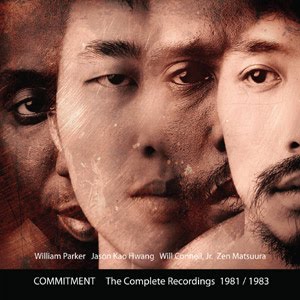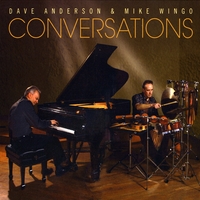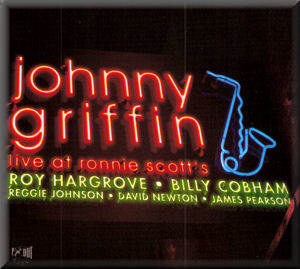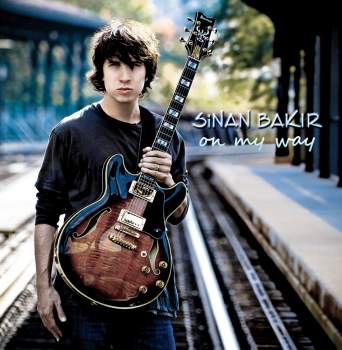In which the beleaguered reviewer attempts to make some headway into the mounds of CDs seeking reviews accumulating daily by providing quick hits on a few recordings at a time.
 Suresh Singaratnam - "Lost in New York"
Suresh Singaratnam - "Lost in New York"
Suresh Singaratnam's exciting debut Lost in New York is a personal reexamination/exorcism of his experiences as a music student in New York in the 2000s. The Zambia-born trumpeter's love of music led him to relocate - first to Toronto and then to NYC - where he graduated from the Manhattan School of Music with a double major in both jazz and classical music (following the lead of his early hero - Wynton Marsalis). This music was written to describe the experiences he encountered during that time in his life. The confusion and excitement of the city, feelings of lacking confidence as well as unbridled optimism, love and loss are all recounted here in musical form and it is (like life itself) a rewarding, albeit at times harrowing, journey. "Temporal Incursions" lurches toward you like that serial killer you can't escape in your nightmare, and this frenetic opening number immediately introduces you to NEW YORK - where hopeful possibilities beckon, but fear and danger are present in the swirling surroundings as well. The shifting bass motif drives the high-octane band - which includes young piano star Fabian Almazan (seen here in Chicago recently with Terence Blanchard), bassist Fraser Hollins, tenor saxophonist Jake Saslow, drummer Lee Pearson and guitarist Jesse Lewis - whose blistering licks serve to take this song into more of a jazz/rock fusion vein. "M104" follows with a rapid walking bass line-driven number that sounds like it could have come from the '50s and features some nice solos from the young bandleader, Almazan and Saslow over the hard-charging rhythm section. The first third of the album ends with "Beneath a Smile," which combines a bright bouncy and traditional sounding melody with contrasting harmonic darkness and minor-inflected sections that seem to point out the struggle and sadness beneath the facade.
"Spring For All But Me" brings in pianist Jamie Reynolds and vocalist Charenee Wade on a beautiful, but clearly bittersweet ballad. Singaratnam shows lovely pure tone here on his understated solo that speaks of regret. "Chrysanthemum" is a punch-drunk expression of new love that staggers, swings and skips in playful fashion. This fine arrangement combines the traditional with fresh new ideas of harmony and rhythm and clever solos. "Fortress of Song" offers a mournful contrapuntal melody which is repeated and soloed over by everyone except the trumpeter - not unlike the traditional New Orleans funeral dirge - and building into a hurricane - complete with Lewis generated guitar electronics. "Remnants of Eternity" is a complex piece built on a simple theme and showcasing excellent work from the entire band, including Alamazan, Lewis and Singaratnam on muted and unmuted trumpet, which engenders a feeling of emerging from sadness into perhaps a more mature form of hope. The waltzing "She Spoke Well" looks back on a love affair - not with soul-crushing remorse, but more of a focus on experience gained and fond thoughts remembered. Hollins - who is a rock throughout (along with Pearson) is given a well-deserved solo turn here. The album ends with the exhilarating polyrhythmic "Peripheral Fission" (Saslow's slippery sax work is such a nice complement for Singartnam's jittery trumpet and Pearson's machine gun drumming) - and this vibrant song gives us a glimpse of what hopefully we will be hearing more of in the future from this talented young composer. Great songwriting and great playing from a well-chosen group of musicians - Lost in New York is a superb debut that deserves your attention.
www.whoissuresh.com
Commitment - The Complete Recordings 1981/1983
 (No Business Records)
(No Business Records)
An incredible two-disc recording documenting the talented but under-represented Afro-Asian avant garde quartet that included reed player Will Connell, Waukegan-born violinist Jason Hwang Kao, bassist William Parker and drummer Zen Matsuura. Commitment recorded one self-titled album - generally unavailable for years - which has been remastered and included here, along with previously unheard concert recordings from a European tour. The group was active between 1978 and 1984, during the heyday of the New York's Lower East Side loft scene, when a sense of comraderie prevailed amongst the musicians of all cultures who intermingled in the area. Promoting a belief that music is a "healing force," this multi-cultural foursome has gone on to continue their musical explorations in various configurations, but this release is more than just a trip down memory lane - the music is vital and surprisingly fresh and modern. Combining Asian influences with African American jazz is not particularly unusual these days - especially in Chicago, where artists like Tatsu Aoki, Yoko Noge and Jeff Chen continue to merge boundaries, but when Commitment was starting up, it was revolutionary and steeped in the anger over the racism that both cultures had experienced. With the sound of the Watts riots still ringing in their ears, these musicians lashed out with a righteous ferocity that still seems startling. However, their aggression is tempered by their musicianship and sense of the melodic, harmonic and rhythmic components of music.
Connell's traditional jazz experience gives the music a melodic center; his flute playing especially creates a sense of wonder. Kao, meanwhile, brings in the Eastern sense of tonality and classical music directions, but he certainly isn't afraid to mix it up - check out his hair-raising solo on "Ocean." The duo had played together for a considerable time and their sense of interplay is breathtaking. Meanwhile, Matsuura shows he has studied powerhouse drummers like Max Roach and has a catalog of beats and sounds that easily moves across styles and cultures. Parker, of course, is noted for his innate almost primal way of approaching the bass as if it were not a separate instrument, but part of his body and soul itself. The interaction between the group members is highly organic, emotional and logical. The studio recorded material is simply brilliant - why this recording has been neglected is beyond me. On the other hand, the live recordings suffer slightly from sound quality - you can hear audience members obliviously chatting during the music - but is more than made up for by the power, feel and intelligence of the performances. This is avant garde jazz at its best and will provide hours of enjoyment for the open-minded listener.
www.nobusinessrecords.com
 Dave Anderson & Mike Wingo - "Conversations"
Dave Anderson & Mike Wingo - "Conversations"
Piano duos are fairly commonplace, but a duo of piano and percussion is hardly an every day occurrence. What allows this fine new release from Washington D.C.-area pianist Dave Anderson and drummer Mike Wingo from becoming a mere novelty album is the fact that both players are not only excellent musicians, but that they listen to each other and play off one another so well. The duo starts off with a delectable version of "It Might as Well be Spring," with Anderson providing an engaging interpretation and Wingo responding with bongos and a plethora of percussive accompaniment. This interesting presentation continues across well known songs like "Gentle Rain," a gorgeous "I've Grown Accustomed to Her Face," "Lucky Southern," "Autumn Leaves" (where Wingo's percussion simulates the sounds of rustling leaves) and "In a Sentimental Mood," as well as several lesser-known gems like Jobim's "If You Never Come to Me," Richard Rogers' "Spring is Here" and Chick Corea's "La Fiesta." Anderson also includes three originals: the joyous "Song Is You," haunting "Sunrise" and "Light of Darkness." Anderson's playing has a bit of a "Keith Jarrett-meets-Vince Guaraldi" feel - with elements of Bill Evans and classical music thrown in. Wingo, meanwhile, has a knack for adding the right sounds and rhythms at the right place - and it is obvious these two musicians have performed together and have a feel for each others' tendencies. The lack of any other musicians not only does not infringe upon the enjoyment here, but rather frees both players to provide more than they are probably generally asked to contribute, and with more clarity, and this makes for a satisfying experiment in sound based on musical conversations between two sensitive musicians.
www.daveandersonmusic.com
Johnny Griffin - "Live at Ronnie Scott's"
 The "Little Giant," Johnny Griffin's official final recording is a live release taken from a two-night session at London's fabled Ronnie Scott's, and featuring trumpeter Roy Hargrove and drummer Billy Cobham in an exuberant, belated 80th birthday celebration for the master saxophonist. The "fastest gun in the West" showed that he still had chops aplenty and Griffin sounds energized in the presence of Hargrove - who is playing at the top of his game here. Starting off with an appropriately upbeat version of "Lester Leaps In" (Lester Young being a major influence on Griffin) - the saxophonist makes me hope I'm having that much fun if I get lucky enough to make it to 80. British pianist James Pearson - the house pianist at Ronnie Scott's - adds some nice work on this track as well, while fellow Brit, David Newton holds down the keys on most of the rest of the recording. (Apparently technical difficulties occurred during the recording of the first night and Pearson had a prior commitment on the second nigh and thus missed out) The exception is a horn-less version of "How Deep is the Ocean" that is sung and played by Paul Kuhn and appears somewhat surprisingly 2/3rds of the way through the recording (the liner notes explain that Kuhn was a frequent collaborator, who Johnny wanted on this album). Cobham adds a solo on the opener that reminds you that he isn't just a great fusion player, while Swiss-based bassist Reggie Johnson is synced-in nicely with his drum partner. Hargrove pulls out his velvety flugelhorn for a delicious version of Jimmy Giuffre's "When We Were Young," that shows Griffin's unique way with a ballad. And speaking of fun - check out how Griffin throws out "Santa Claus is Coming to Town" to which Hargrove responds with "Twinkle Twinkle" on a raucous version of Clifford Brown's "The Blues Walk." Hargrove adds a lovely tribute to Griffin - "Mentor" that also features pianist Newton - a seven-time British Jazz Awards winner on a beautiful solo that complements Hargrove perfectly. Meanwhile, Griffin the composer is not-ignored, as the album ends with two Griffin compositions - the sweetly swinging, bluesy "The Jamfs are Coming" and the burning "Hot Sake." An enjoyable farewell to a true jazz legend.
The "Little Giant," Johnny Griffin's official final recording is a live release taken from a two-night session at London's fabled Ronnie Scott's, and featuring trumpeter Roy Hargrove and drummer Billy Cobham in an exuberant, belated 80th birthday celebration for the master saxophonist. The "fastest gun in the West" showed that he still had chops aplenty and Griffin sounds energized in the presence of Hargrove - who is playing at the top of his game here. Starting off with an appropriately upbeat version of "Lester Leaps In" (Lester Young being a major influence on Griffin) - the saxophonist makes me hope I'm having that much fun if I get lucky enough to make it to 80. British pianist James Pearson - the house pianist at Ronnie Scott's - adds some nice work on this track as well, while fellow Brit, David Newton holds down the keys on most of the rest of the recording. (Apparently technical difficulties occurred during the recording of the first night and Pearson had a prior commitment on the second nigh and thus missed out) The exception is a horn-less version of "How Deep is the Ocean" that is sung and played by Paul Kuhn and appears somewhat surprisingly 2/3rds of the way through the recording (the liner notes explain that Kuhn was a frequent collaborator, who Johnny wanted on this album). Cobham adds a solo on the opener that reminds you that he isn't just a great fusion player, while Swiss-based bassist Reggie Johnson is synced-in nicely with his drum partner. Hargrove pulls out his velvety flugelhorn for a delicious version of Jimmy Giuffre's "When We Were Young," that shows Griffin's unique way with a ballad. And speaking of fun - check out how Griffin throws out "Santa Claus is Coming to Town" to which Hargrove responds with "Twinkle Twinkle" on a raucous version of Clifford Brown's "The Blues Walk." Hargrove adds a lovely tribute to Griffin - "Mentor" that also features pianist Newton - a seven-time British Jazz Awards winner on a beautiful solo that complements Hargrove perfectly. Meanwhile, Griffin the composer is not-ignored, as the album ends with two Griffin compositions - the sweetly swinging, bluesy "The Jamfs are Coming" and the burning "Hot Sake." An enjoyable farewell to a true jazz legend.
www.inandout-records.com
Chris Washburne & the SYOTOS band - "Fields of Moons"
 (Jazzheads)
(Jazzheads)
Has fiery trombonist Chris Washburne gone soft? Some fans may be wondering once they realize that Washburne and the SYOTOS band's new release, Fields of Moons focuses on the softer, more melodic side of the band. Washburne - whose Land of Nod was one of our top albums of 2006
(see our review here) has opened eyes with his Latin band arrangements - which often involve unusual shifts, quirky, aggressive and inventive directions, while also stirring things up with his political pronouncements and work with his Euro-American combo NYNDK. So when the new album opens with two lush and gentle lullabies, written for Washburne's young children, listeners may be forgiven for wondering just what the heck is going on here. Washburne explains that the band has been together now for 20 years and they have always featured softer music and ballads in their repertoire. Once you get past the initial shock, you will realize that the songs still contain Washburne's trademark horn arrangements, still highly colorful, just presented without the sometimes jarring changes, and with more of an emphasis on the melodic. Lushly arranged and quite enjoyable, the song list includes the two lovely opening lullabies, a fine version of Pedro Flores' "Obsesion," a simmering take on the oft-covered "Poinciana," Charles Mingus' gorgeous "Duke Ellington's Sound of Love," a brilliant danzon version of Benny Carter and Spencer Williams' "When the Lights are Low" and a delightful version of "Do You Know What it Means to Miss New Orleans" - with Washburne switching over to tuba on a song made even more poignant to those of us who love that city and in light of recent events. Additionally, fellow members Ole Mathisen (saxes and clarinet) and Barry Olsen (piano) contribute strong original numbers, to what is truly a group outing. Fine playing throughout - and the front liners - including trumpeter John Walsh - especially shine in both shimmering harmonic work and highly tasteful solos. I do admit to missing the kick I get out of Washburne's inventive rhythmic forays and attitude, but this recording effectively showcases this under-appreciated band's other - more romantic and traditional side and perhaps will help gain a new and wider audience in the process. A beautiful recording and a nice way to kick back and relax.
www.chriswashburne.com
 Norman Johnson - "If Time Stood Still"
Norman Johnson - "If Time Stood Still"
(Pacific Coast Jazz)
Time does seem to stand still a bit on this tasty recording from Jamaican-born guitarist Norman Johnson. A long-time sideman on the East Coast jazz scene who makes his home in Hartford, CT, Johnson has crafted a pleasing album of mostly original songs that mix straight-ahead and contemporary sounds with a touch of the islands. Johnson has a style that is clearly in the Wes Montgomery/George Benson vein, with some Earl Klugh touches thrown in. And like Klugh, Johnson uses a nylon-string acoustic guitar on several numbers to fine effect. Opener "It's Time to Fly" recalls mid-career Benson, with nice supporting work from keyboardist Ken Fischer, bassist Tyler VanOstrand, drummer Bob Forte and percussionist Greg Allen. On "Acoustic Groove" plays acoustic guitar and bass over a programmed rhythm bed on a track that sounds like a choice cut for contemporary radio. The only cover is an interesting version of Pat Metheny's "Always and Forever" - with Chris Herbert on tenor sax and Johnson taking the melody into a satisfying "Wes Montgomery-meets-smooth-jazz" electric guitar vibe, something that continues on "As it Is." The group expands to include a horn section on the bubbly samba "Starting Tomorrow," adding Herbert on tenor and flute, Steve Davis on trombone and Josh Bruneau on trumpet. Herbert's flute plays unison lines with Johnson's nylon string guitar before trading solos, while Martin Obeng adds some generous percussion and he and Forte shine on their solo spotlight on this bouyant number. The bluesy "Can I Get an Amen" showcases Herbert on alto and tenor sax, while the beautiful title track takes things a completely different way - utilizing a string quartet and giving VanOstand a nice bass solo moment. The use of so many different sounds - Johnson moves from acoustic to electric and back, Fischer switches from acoustic to electric piano throughout, Herbert pulls out his soprano sax on "Unforgiven," and Davis' trombone is featured on "All in Time" - creates a truly colorful presentation on this well-balanced and attractive recording. Johnson has been on the scene for many years, but with his fine debut he makes the case that it may be time that he be considered one of the bright new stars on the contemporary jazz guitar scene.
www.normanjohnsonguitar.com
Sean Jelinek - "Common Tones"
 We are familiar with drummer Jelinek primarily through his fine work with Pete Carney's Orange Alert. He returns to our attention with a new album of left-of-center original tunes that combine a wide range of styles, from straight-ahead post bop to modern drum and bass, with a considerable Latin influence at times. "Do I Dare" explodes like a firecracker with Jelinek and Kurt Schweitz on fast walking bass driving things. Christopher McBride on alto and Greg Spero on piano provide some sparkling solos, while Jelinek's percussive fills help take the song out on a high note. Not sure what Jelinek has been up to, aside from creating this album, but would be nice to see him out in the jazz clubs more often. "San German" follows and takes things into a romantic and sultry tango featuring Melvin Butler on tenor sax and Marques Carroll on trumpet. Perhaps the highlight of the strong opening trio of songs is the hard-charging "In the Path of the Tornado" where Jelinek and Schweitz lay down some "Future Sounds of London"-style bass and drums over which the soloists can frolic with abandon. "Pisces Moon" starts in 6/8 before moving into a burning middle section, while "Josceline" is a lovely Latin number with stellar work from emerging star Spero and a breathy tenor solo from Butler. This direction moves even further into a fiery Afro-Cuban outburst on "Resistance" with more great work from Spero - who is making a name for himself as a keyboard player who can successfully play across many styles. The funky title track moves the underrated Schweitz over to electric bass - on a delightful number where everyone gets into the act with great solos. After the waltzing "CJ's Waltz," the talented bassist takes the opportunity to show off his considerable chops on electric on the Sly Stone-meets-James Brown funker "Gettin' it Up," a number on which Jelinek gets down on his skins as well. Schweitz starts off the epic album-ending "Phoenix Rising" with an acoustic bass solo. Exciting and mature compositions from Jelinek, combined with great player from a group of rising young Chicago musicians makes for a winning recipe on Common Tones.
We are familiar with drummer Jelinek primarily through his fine work with Pete Carney's Orange Alert. He returns to our attention with a new album of left-of-center original tunes that combine a wide range of styles, from straight-ahead post bop to modern drum and bass, with a considerable Latin influence at times. "Do I Dare" explodes like a firecracker with Jelinek and Kurt Schweitz on fast walking bass driving things. Christopher McBride on alto and Greg Spero on piano provide some sparkling solos, while Jelinek's percussive fills help take the song out on a high note. Not sure what Jelinek has been up to, aside from creating this album, but would be nice to see him out in the jazz clubs more often. "San German" follows and takes things into a romantic and sultry tango featuring Melvin Butler on tenor sax and Marques Carroll on trumpet. Perhaps the highlight of the strong opening trio of songs is the hard-charging "In the Path of the Tornado" where Jelinek and Schweitz lay down some "Future Sounds of London"-style bass and drums over which the soloists can frolic with abandon. "Pisces Moon" starts in 6/8 before moving into a burning middle section, while "Josceline" is a lovely Latin number with stellar work from emerging star Spero and a breathy tenor solo from Butler. This direction moves even further into a fiery Afro-Cuban outburst on "Resistance" with more great work from Spero - who is making a name for himself as a keyboard player who can successfully play across many styles. The funky title track moves the underrated Schweitz over to electric bass - on a delightful number where everyone gets into the act with great solos. After the waltzing "CJ's Waltz," the talented bassist takes the opportunity to show off his considerable chops on electric on the Sly Stone-meets-James Brown funker "Gettin' it Up," a number on which Jelinek gets down on his skins as well. Schweitz starts off the epic album-ending "Phoenix Rising" with an acoustic bass solo. Exciting and mature compositions from Jelinek, combined with great player from a group of rising young Chicago musicians makes for a winning recipe on Common Tones.
 Ole Mathisen - "Periodic Table"
Ole Mathisen - "Periodic Table"
(Jazzheads)
Norwegian-born saxophonist, Ole Mathisen - a member of NYNDK and SYOTOS, who appears on the Chris Washburne and SYOTOS album reviewed above - studied to become chemist like his father before switching to music full time, so it is no surprise to see the inventive musician using the periodic table of elements as a basis for his new album. Mathisen's quartet consists of bassist Francois Moutin, drummer Tony Moreno and guitarist Kenny Wessel, who are quite suited to undertake Mathisen's unusually devised compositions. For example, the opening number, "Argon" takes the idea that Argon is the 18th element in the table and utilizes a saxophone melody consisting of 18 notes. "Boron," named for the 5th element has a 5/4 bass line and uses its atomic weight of 10.8 to help set the form. And so on - you get the picture. While this may sound clinical and too intellectual to produce actual music that is worth listening to, the exact opposite occurs. This music is fresh and organic (perhaps due to the players' abilities to work together so well), and in fact the experiments with various time signatures and pitches is fascinating and often is quite humorous. Wessel produces some intriguing guitar tones - check out his extra-freaky solo on "Sodium." Throughout, Mathisen tries out his ideas of having the melody move slightly slower or faster than the accompanying rhythm. The results are somewhat disjointed, yet seem as natural as a Mandelbrot set. "Hydrogen" (as in the bomb) is scary, but "Fluorine" is almost danceable (shockingly as it is in 19/8). So put on your goggles and white lab coats, break out the beakers and Bunsen burners, because it is party time in the lab.
www.myspace.com/olemathisen
Sinan Bakir - "On My Way"
 Another guitarist from Hartford, CT (see Norman Johnsons review above), this one by way of Turkey, young Sinan Bakir shows a maturity well beyond his youthful appearance. The young man favors a clean tone and assured, John Scofield-like approach. Backed by bassist Thomas Kneeland and drummer Mark Ferber, the guitarist starts off with two nicely paced mid tempo numbers before things really kick into high gear on the sinewy "Oddity" and rocking "Stop N' Go." Bakir calls upon some of his heritage in some moments on his solos which exhibit a bit of Middle-Eastern influence. "Ice Orbits" is cool and subtle, while "Karma" is high-stepping fun. "Blues for Istanbul" combines Turkish directions with the blues, while "Play!" has an engaging Latin touch that is delivered with jubilant energy by the trio. A nice mixture of slower-paced and faster material, played well. Bakir does indeed seem to be a young musician "on his way" and I will be interested to see where he takes his talent next.
Another guitarist from Hartford, CT (see Norman Johnsons review above), this one by way of Turkey, young Sinan Bakir shows a maturity well beyond his youthful appearance. The young man favors a clean tone and assured, John Scofield-like approach. Backed by bassist Thomas Kneeland and drummer Mark Ferber, the guitarist starts off with two nicely paced mid tempo numbers before things really kick into high gear on the sinewy "Oddity" and rocking "Stop N' Go." Bakir calls upon some of his heritage in some moments on his solos which exhibit a bit of Middle-Eastern influence. "Ice Orbits" is cool and subtle, while "Karma" is high-stepping fun. "Blues for Istanbul" combines Turkish directions with the blues, while "Play!" has an engaging Latin touch that is delivered with jubilant energy by the trio. A nice mixture of slower-paced and faster material, played well. Bakir does indeed seem to be a young musician "on his way" and I will be interested to see where he takes his talent next.
www.sinanbakir.com
 David Thompson - "Introspect"
David Thompson - "Introspect"
Former Chicagoan, David Thompson contacted us re: Luciano Troja's recent cd of Earl Zindars' music (see here). Thompson, a pianist now living in Chico, CA, had some interesting information to share about the late Zindars, who he says gave him several unrecorded compositions in the '90s. Thompson also says he plans on including several Zindars songs on his upcoming trio album - which we hope he will share with us when it is released. In the interim, he has supplied us with his 2008 solo piano release Introspect, on which the talented pianist interprets nine beloved standards in a rewarding manner that most closely reminds one of the late Bill Evans for his use of color and improvisational directions. Jules Styne's "Make Someone Happy" starts things off on an upbeat and happy mode, while "Days of Wine and Roses" is given the weight of profound reflection it deserves. Thompson's intensive examination of players like Chick Corea, Keith Jarrett, George Shearing, Billy Taylor and his years of study with Shearing, Joanne Brackeen and Don Haas have helped him develop an uncanny ear for melody and harmony, and he uses the keyboard as a painter would to layer tones to create a whole. Solo piano aficionados will love his versions of classics "A Time For Love," "In Your Own Sweet Way," "My Funny Valentine" and several more - all of which offer richly orchestrated chords and surprising improvisational directions which take the original songs into new and rewarding directions. "How Deep is the Ocean" and "Stella by Starlight" are both given loving attention, while Thompson also resurrects Gerswin's "I Loves You Porgy" and a Ray Noble gem - "The Touch of Your Lips" in a freewheeling pinwheel of ascending lines. Thompson shows himself here to be an exceptionally tuned-in interpreter of the standards that I think listeners will enjoy, and I look forward to also hearing what he will offer us in a trio setting.
www.davidthompsonjazz.com
Ratko Zjaca, John Patitucci, Steve Gadd, Stanislav Mitrovic, Randy Brecker - "Continental Talk"
 (In+Out Records)
(In+Out Records)
Croatian guitarist Zjaca studed with such masters as Pat Metheny, Joe Pass, Jim Hall, Mike Stern, John Abercrombie and Mick Goodrick in Europe before moving to NYC. He has recorded several previous albums as a leader, including A Day in Manhattan with Reggie Workman and Al Foster, and 2007's Crossing the Border with Foster, bassist John Patitucci and saxophonist Stanislav Mitrovic. For Continental Talk, Steve Gadd replaces Foster, while Patitucci and Mitrovic return. Additionally, trumpeter Randy Brecker appears on three of the final five tracks. The comfort level between the players, and of course the talent, are made even more readily apparent when Zjaca says all 12 tracks were first takes - something that is hard to fathom based on how together everything sounds, but understandable in how freshly the compositions are rendered. Zjaca's songs are generally mid-tempo and intricate ("Breakfast in Tokyo," "The New Life") and never sound forced or hurried. His clean guitar tone combined with Pattitucci's patient undulations anchor the sound, while Gadd has the freedom to create a plethora of rhythm elements. Mitrovic's saxes (tenor and soprano) take hold of the melodies and fly with them on numbers like the Brazilian-flavored "Portrait in Retrogade." I hate the term "post-bop," but the description does seem fit well here, as the quartet builds on tradition while obliterating cultural and musical boundaries to create a merger of American and European jazz (with occasional Latin touches: "Home Again," the funky "The Gate"). Zjaca's guitar work recalls the work of his mentors, but with his own personal voice. He usually relies on his electric, but shows a masterful touch on acoustic guitar on "At the Crossroads" and "Anibas" The guitarist supplies most of the music here, while Mitrovic adds in three numbers of his own, including two of the three featuring the veteran Brecker - who lights up the recording with his incendiary playing.
www.ratkozjaca.com
